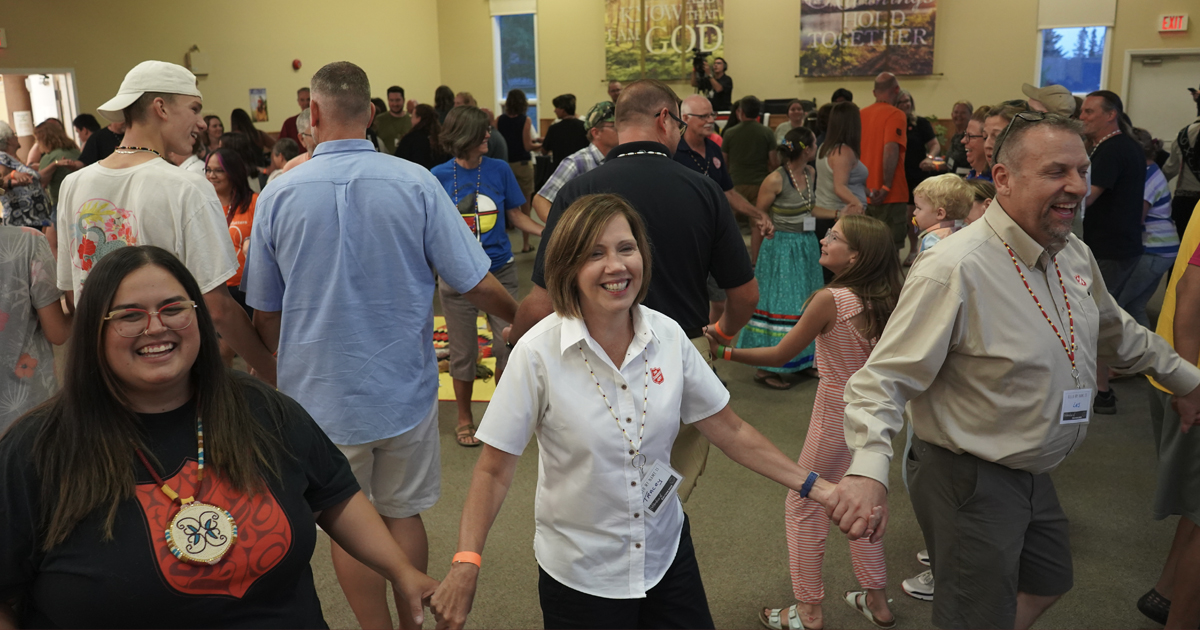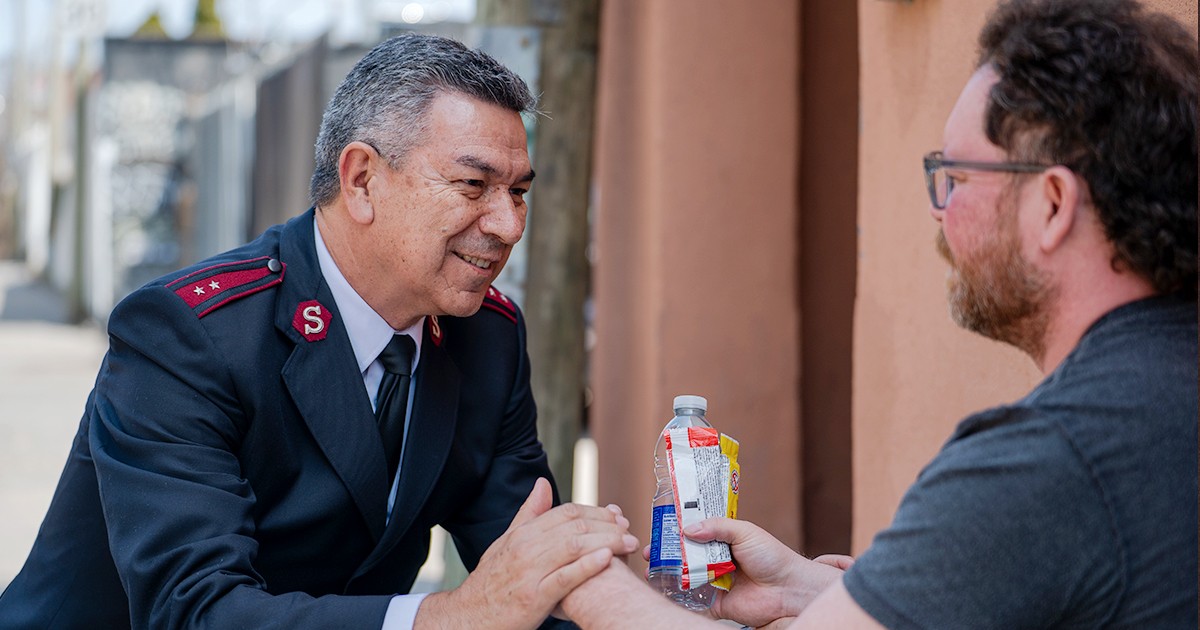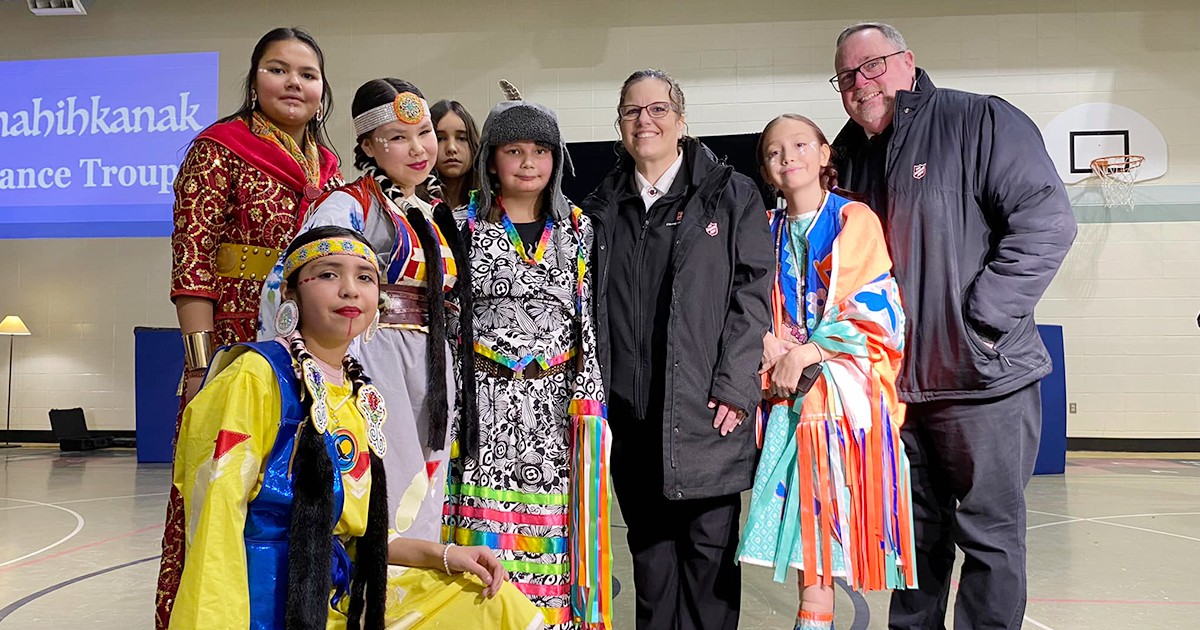(Above) Cpt Crystal Porter, Commissioner Tracey Tidd, territorial president of women’s ministries, and Lt-Col Les Marshall, territorial secretary for mission, join in a round dance at The Salvation Army’s fifth annual Celebration of Culture (Photo: Connie Donlon)
If you flip through a history book, you will read about the expeditions of John Cabot, Christopher Columbus or Lewis and Clark. They are painted as heroes, as brave and resilient explorers destined to find a new world with bountiful resources. History speaks of each difficult journey they endured, of their greatness and undying commitment to England, Spain or the newly formed United States.
What you might not read about is the Papal Bull (a public decree or edict) underlying these expeditions, which declared that “the Catholic faith and the Christian religion be exalted and be everywhere increased and spread … and that barbarous nations be overthrown and brought to the faith.” Closely related to this “Doctrine of Discovery” was the concept of terra nullius, meaning “nobody’s land,” which held that “no one owned the land prior to European assertion of sovereignty.”
But it wasn’t ‘nobody’s land.’ The land wasn’t empty. History books neglect the story of the Beothuk, Lucayan, Taíno and countless other Indigenous Peoples who encountered the explorers and suffered greatly. The Doctrine of Discovery endorsed the idea that they were not people and that their ways of life were primitive, justifying inhumane treatment and discrediting their sacred ceremonies, language and knowledge. It placed people in a hierarchical structure and insisted that there was only one right way to live.
This doctrine provided the groundwork for various other assimilationist polices, such as the Indian Act, which continue to be actively present within Canadian laws and policies. Whether forgotten or ignored, the Doctrine of Discovery is not a thing of the past. Its impact continues to reinforce harmful stereotypes.
Recognizing the legacy of the doctrine and doing the work of dismantling will not be easy—it will require the strength to endure painful realizations and the courage to quietly listen—but it is necessary, in both our communities and our churches.
This doctrine, under the guise of Christian mission and the expansion of the gospel, is part of the framework of western Christianity. It placed parameters on human dignity, justified the destruction of sacred spaces and continues to feed into the historic narrative that Indigenous culture and faith does not have a place in the gospel of Jesus.
I have struggled with the reality of colonial history within the church. I have struggled with how the Doctrine of Discovery continues to place boundaries on justice, dignity and love. I have struggled with how it continues to perpetuate the myth that Indigeneity does not have a place in the Christian church.
This doctrine claims that there is only one right way to worship the Creator, that there is only one way to live in right relationship with Jesus. Often, Indigenous followers of Jesus are met with cynicism, judgment and contempt, rather than seen for the beautiful ways that we have experienced Creator’s Son within our culture.
I am thankful for sacred spaces such as the Celebration of Culture, held in partnership with Indigenous Pathways and The Salvation Army, where Christian faith and culture collide to create a colourful mosaic. An event such as this shatters barriers while creating a firm foundation in Christ, so that all followers of Jesus are welcomed into the circle. It embodies what Paul describes in 1 Corinthians 12 as the body of Christ. Although diverse, we are one body brought together through our commitment to Jesus.
I am thankful for the United Nations Declaration on the Rights of Indigenous Peoples and the final report of the Truth and Reconciliation Commission because they outline ways to dismantle the Doctrine of Discovery and walk in right relations with Indigenous communities. It is a long journey, but I believe it is essential for The Salvation Army.
As we build communities that are just, are we not called to dismantle frameworks that promote injustice? As we share hope and extend the love of Jesus, are we not called to right the wrongs that we’ve seen throughout history?
I have often heard it said by Indigenous theologians that many of our ancestors were not given the good news of Jesus Christ—rather, they were fed bad news, out of greed for land and resources.
Perhaps it is time to retell the story. The story where explorers were entitled wanderers desperate to find land, rather than brave heroes. The story where Indigenous nations were mistreated, pillaged and massacred. The story where Jesus went against societal norms so that women, children and the outcast would find hope. The story where Paul embraced diversity within the body of Christ.
Perhaps it is time.
Captain Crystal Porter is the associate territorial Indigenous ministries consultant and divisional Indigenous ministries consultant in the Prairie Division.










Comment
On Thursday, November 24, 2022, Doug Peat said:
Leave a Comment